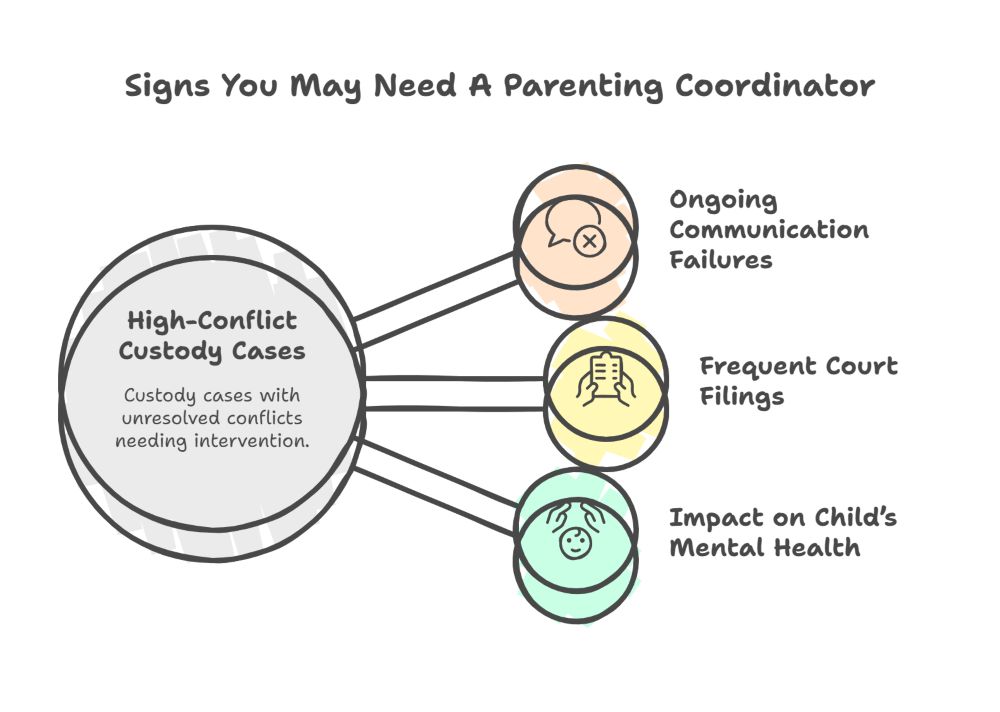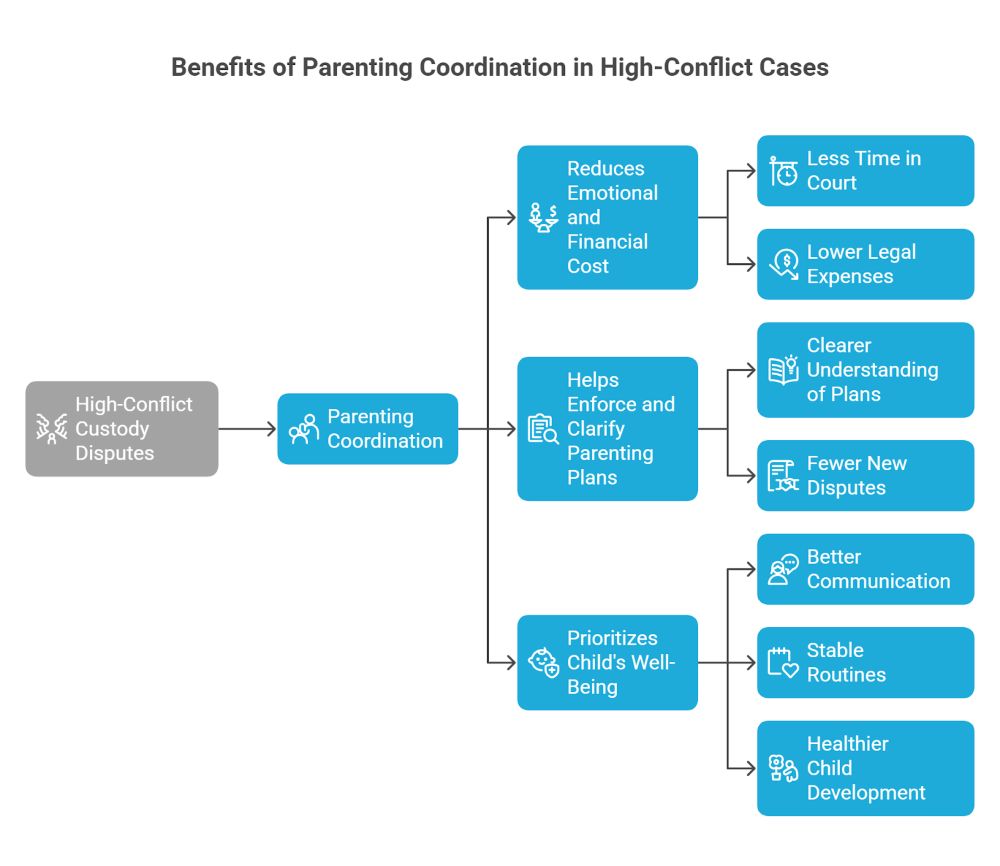

Originally published: June 2025 | Updated: August 2025
High-conflict custody battles can make it challenging for parents to agree on what is best for their children. Emotions run high, communication breaks down, and court orders often don’t solve day-to-day struggles.
Parenting coordination provides separated parents in Illinois with a lifeline to reduce conflicts, enhance communication, and maintain a focus on the children’s needs.
A parenting coordinator serves as a neutral guide, assisting families in resolving conflicts, making informed decisions, and adhering to parenting plans.
In Illinois, this service is often utilized when co-parents are unable to work together or shield their children from ongoing conflict, making it a crucial tool for many families facing these challenges.
Parenting coordination in Illinois helps parents resolve lingering conflicts about decisions for their children after separation or divorce.
Illinois family courts often utilize this tool in high-conflict cases to mitigate ongoing disputes and promote more stable parenting arrangements.
Parenting coordination is a process that involves a neutral professional who assists separated parents in managing disputes regarding their children.
The court appoints a parenting coordinator to assist parents in communicating, resolving disagreements, and maintaining a focus on the child’s best interests.
Unlike traditional mediation, parenting coordination can continue after a court enters a parenting plan.
Tasks may include clarifying schedules, handling changes, and resolving issues without requiring a return to court.
This approach seeks to minimize conflict and protect children from ongoing arguments.
The coordinator cannot make major decisions on behalf of the parents, but they can assist with issues such as pick-up times, holidays, and adhering to the current court order.
Some benefits in high-conflict cases include reduced court time, lower parental stress, and more consistent routines for children.
This service is especially effective when parents struggle to cooperate or communicate on their own.
Illinois law sets clear requirements for individuals to serve as parenting coordinators in family court.
To qualify, a person must have a background in mental health, family law, or a related field.
Many parenting coordinators are experienced attorneys, psychologists, or social workers who have special training in conflict resolution, child development, and mediation.
The Illinois Supreme Court created Rule 909, which sets minimum standards for qualifications and training.
For example, coordinators are required to complete specific training programs and maintain their education regularly.
Cook County and other local courts may impose additional requirements; therefore, parents should check with their local court or consult their attorney.
A qualified parenting coordinator is always appointed as a neutral party.
This means the coordinator does not represent either parent and must avoid situations that create conflicts of interest.
Their primary duty is to support the children and help parents stick to the family court’s orders.
Illinois family courts order a parenting coordinator mainly in high-conflict or complex custody cases.
Judges may assign a coordinator after the court approves a parenting plan or, in special cases, even before the plan is final if both parents or the court agree.
The court will consider factors such as repeated disputes, frequent violations of court orders, or when direct communication between parents is harmful or ineffective.
In Cook County and many other areas, the court often uses a coordinator as a last resort before holding multiple court hearings over similar issues.
Examples of when a coordinator may be appointed include:
Parents can also request that the court appoint a coordinator, but the judge makes the final decision based on what will help reduce conflict.

High-conflict custody cases often involve problems that courts alone cannot solve.
These issues can disrupt communication, waste time on legal battles, and have a serious effect on a child’s mental health.
When parents struggle to talk and cooperate, the effect can be harmful for both the adults and the child.
In Illinois, parenting plans rely on strong communication, but some parents find themselves stuck in arguments over drop-off times, school events, or schedule changes.
Emails and texts are often misunderstood or ignored. Meetings usually end in disputes or without a clear resolution.
This makes joint custody almost impossible to carry out smoothly. A parenting coordinator steps in as a neutral third party to help parents talk through disagreements about their child.
Coordinators guide conversations and keep things focused on what is best for the child, helping families manage and resolve ongoing parenting plans and communication breakdowns.
This approach offers genuine high-conflict parenting assistance in Illinois without necessitating a return to court for every disagreement.
Sometimes, parents file motions in court regarding minor issues, such as bedtime, activity choices, or vacation plans.
These filings can cause stress, increase legal costs, and delay solutions for families in high-conflict custody cases.
Judges may not have time to handle each minor dispute. Instead, repeated court cases can further harm trust and communication.
A parenting coordinator can help resolve these minor issues outside of court with less expense and delay.
By making decisions or guiding parents through solutions, coordinators lower the number of court filings and help enforce child custody dispute agreements.
This keeps focus on the child and avoids the negative cycle of court battles over parenting plans.
Constant conflict between parents is one of the main risks to a child’s well-being during custody battles.
Children who witness arguments or feel caught in the middle may suffer stress, anxiety, and problems at school or home.
They might become worried about exchanges between parents or feel pressure to pick sides.
When fighting drags on, a child can lose their sense of security and find it hard to build a healthy relationship with both parents.
Working with a parenting coordinator can shield children from exposure to adult disagreements and encourage more stable routines.
By supporting healthy and meaningful parent-child relationships, parenting coordinators put the focus back on the child’s needs, offering a practical solution for high-conflict parenting help in Illinois.
If custody battles persist, Cooper Trachtenberg Law Group can help you explore parenting coordination to mitigate the conflict. Contact us for a confidential review of your situation.
If you’re ready to get started, call us now!
Parenting coordinators play a crucial role in helping families navigate and manage custody conflicts.
They help parents work through disagreements, keep children’s needs as the main focus, and often resolve issues that might otherwise end up back in court.
In Illinois, parenting coordinators have clearly defined authority, as established by the court order or agreement between the parties.
They do not replace the judge, but can assist with day-to-day decisions regarding the parenting plan, exchanges, and schedules.
Parenting coordinators work to resolve disputes over simple matters, such as pickup times or school events.
They also help when parents disagree about school choices, health care needs, and extracurricular activities.
Their role can include monitoring compliance with court orders or making recommendations.
Sometimes, they may have limited power to decide certain issues, but the court remains in control of major decisions and legal custody.
In the Chicago area, parenting coordination services often focus on supporting the parents in working together without needing repeated court intervention.
A parenting coordinator must remain neutral, meaning they do not take sides, favor one parent, or act as an advocate for either party.
Their main goal is to support the best interests of the children while holding both parents accountable to the parenting plan and court orders.
Parenting coordinators document each step of the process, keeping records of all interactions, recommendations, and agreements.
They can also report concerns to the court, especially if one parent consistently fails to follow recommendations or court orders.
This ensures that both parents meet their responsibilities.
In some cases, the coordinator may be involved in supervised visitation or suggest safeguards if there are safety concerns.
Their role is to create a fair process and help prevent new or ongoing conflicts from affecting the children.
Parenting coordinators create clear systems for communication between parents.
This can include setting up regular meetings, using email or online tools, and defining how parents must notify each other about schedule changes.
They may draft rules for how parents communicate, especially if there is a history of high-conflict exchanges.
This support helps parents stay focused on the children rather than reliving past disputes.
When parents cannot agree, the coordinator steps in to make recommendations or facilitate compromise.
In some instances, and if permitted by court order, the parenting coordinator might decide on issues such as minor schedule changes, which helps avoid another court appearance.

Parenting coordination provides tangible, measurable benefits to families navigating ongoing conflict during custody disputes in Illinois.
It addresses emotional stress, repeated arguments, and confusion over court orders that often impact both parents and children.
High-conflict custody disputes often result in repeated courtroom appearances and substantial legal fees. Attorneys’ fees, court costs, and time away from work can quickly add up, creating a significant financial burden.
Parenting coordinators step in as a neutral third party to help parents resolve disputes outside of court. With their help, parents spend less time in front of a judge and more time reaching solutions in real life.
This approach can save families thousands of dollars in legal expenses.
Emotionally, families also see relief. The stress and anxiety of ongoing court battles decrease when parents have a professional guiding their communication and helping to settle disagreements.
According to the High Conflict Institute, this process helps lower overall tension for everyone involved.
Parenting plans are often detailed, but disagreements still arise regarding schedules, holidays, or decision-making. Parenting coordinators help interpret and enforce these plans when parents are unable to agree.
They can answer questions about the meaning of specific terms or help modify arrangements when needed. If one parent does not follow the plan, the coordinator helps address the problem quickly without a return to court.
Families find it much easier to adhere to the agreement, thereby reducing the likelihood of new disputes.
High-conflict environments can be damaging for children, leading to stress, anxiety, and behavioral issues. Parenting coordinators always keep the child’s best interests as their main concern.
They work with both parents to encourage better communication, reduce arguments in front of the children, and maintain stable routines. By acting as a buffer during heated moments, coordinators help create a more peaceful environment for the kids.
Children benefit from consistent schedules and calmer parents, which supports healthier emotional and social development.
The Association of Family and Conciliation Courts further helps explain how this focus protects children from ongoing conflict.
Tired of court dates over simple parenting issues? Cooper Trachtenberg Law Group offers parenting coordination services that help restore structure to high-conflict custody cases. Schedule a strategy session today.
If you’re ready to get started, call us now!
In high-conflict custody cases, various professionals have distinct responsibilities. Understanding what each role does helps parents know who can best support their family’s needs.
A parenting coordinator works with parents who have ongoing, heated disputes about their children. Their job is usually long-term and continues after a court order or agreement is in place.
They focus on reducing conflict, helping parents stick to parenting plans, and making recommendations if parents cannot agree.
A mediator, on the other hand, is a neutral third party who helps parents reach an agreement before any order is made. Mediation is usually voluntary and short-term.
The mediator does not have the power to monitor families or make recommendations to the court.
In short, a parenting coordinator is often appointed by the court to manage and follow up on families with high conflict, while a mediator helps parents reach an original agreement.
A guardian ad litem (GAL) is a court-appointed person, often an attorney, who represents the best interests of the child in custody cases. The GAL investigates and makes recommendations to the judge about what custody situation will work best for the child.
They may interview the parents, children, and others, then submit a detailed report to the court. A parenting coordinator does not act as the child’s legal representative.
Instead, their primary role is to work with parents on day-to-day parenting disputes, assist with communication, and support the implementation of the parenting plan.
While both roles aim to protect children, the GAL serves as the child’s voice in court, and the parenting coordinator helps manage ongoing conflict outside the courtroom.
There are some high-conflict cases where a judge may assign both a guardian ad litem (GAL) and a parenting coordinator. This usually occurs when there are serious concerns about the child’s well-being or if past recommendations haven’t resolved the conflict.
The GAL focuses on investigating and voicing the child’s best interests in court. The parenting coordinator steps in to help the parents manage day-to-day issues after a custody order is in place.
These professionals work separately but can both be important when parents can’t resolve disputes, and the child’s safety or mental health is at risk.
Courts in Illinois may appoint a parenting coordinator when parents are unable to communicate effectively or implement a parenting schedule.
Knowing how to request one, what information to provide, and how costs work makes the process easier.
Anyone involved in a custody or parenting dispute can request a parenting coordinator by filing a motion with the court.
Typically, a parent’s attorney files this paperwork with the court; however, parents can also file it themselves if they don’t have a lawyer.
The form must be submitted in the county circuit court where the parenting case is ongoing. If both parents agree, they can file a joint motion.
If one party disagrees, the judge will determine whether a coordinator is necessary. Situations where parents are not able to work together or follow parenting plans are common reasons judges consider appointing a coordinator.
The judge may set a court date to review the request. It is important to act quickly if communication between parents is not working.
The motion should include the reason for requesting a parenting coordinator and describe past efforts to resolve issues, such as mediation or counseling.
Parents should explain the issues they are having, such as disagreements over schedules, exchanges, or decisions regarding the child.
Include details about how often disagreements happen and show why other options have failed. List any court orders or parenting plans already in place.
It helps to mention if a specific parenting coordinator is preferred; however, the judge ultimately decides who is appointed. Clarity and detail are important.
Proof of high-conflict behavior or failed attempts to co-parent will help the court make its decision. Requests should also state what the parents hope to achieve by working with the coordinator.
It is essential to select a skilled parenting coordinator who can help mitigate conflict and make co-parenting more seamless.
Factors such as professional experience, proper training, and the coordinator’s approach should guide this choice.
Before choosing a parenting coordinator, parents should inquire about the professional’s background, education, and specific training in parenting coordination in Illinois.
Many qualified coordinators have a background in law or mental health, along with experience in high-conflict family law cases.
Asking how the coordinator handles disagreements or difficult situations will reveal their conflict resolution skills and decision-making process. It’s helpful to know whether the coordinator has been court-appointed or chosen by private agreement in past cases.
Parents should also ask about availability, methods of communication, and any fees or payment schedules.
Understanding how the coordinator helps parents follow, change, or enforce parenting plans can indicate whether their process aligns with the family’s needs.
Key questions to consider:
Cooper Trachtenberg Law Group uses a structured, hands-on method to parenting coordination. Their team combines family law experience and ongoing education in conflict resolution.
They help parents address disputes quickly outside of court. The child’s best interests are kept at the center of every discussion.
The group works with parents to develop clear communication and practical problem-solving skills. They’re skilled at helping families adapt to changing needs or shift parenting plans as children grow.
Regular meetings and goal-setting are part of their process. This helps ensure that issues are addressed before they escalate.
They stay updated on standards and parenting coordination training in Illinois to maintain a professional and current practice.
Cooper Trachtenberg Law Group supports families in crisis with child-first parenting coordination solutions. Start building a healthier path forward—call now to request a private consultation.
What is parenting coordination in Illinois?
Parenting coordination is a court-approved process where a trained neutral helps high-conflict parents follow custody orders and resolve parenting disputes outside of court.
Who pays for a parenting coordinator in Illinois?
Fees are typically split between parents unless the court assigns one party to cover more, based on income and case factors.
Can a parenting coordinator make legal decisions on behalf of a child?
No. Parenting coordinators can suggest solutions and help enforce orders, but cannot change custody arrangements or create new legal orders.
How is a parenting coordinator appointed?
A judge may appoint one by court order after either parent files a motion demonstrating ongoing high-conflict issues.
What’s the difference between a mediator and a parenting coordinator?
Mediators help parties reach agreements. Parenting coordinators stay involved to monitor compliance and resolve disputes after orders are in place.
Is parenting coordination confidential?
Communications may be reported to the court depending on jurisdiction and the terms of the court order. Coordinators often file status updates or recommendations.
Can I request a specific parenting coordinator?
Yes. If both parties agree, you may request a coordinator of your choice. Otherwise, the court selects a qualified neutral from an approved list.